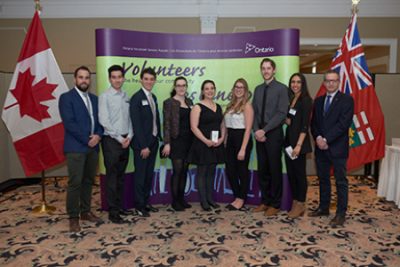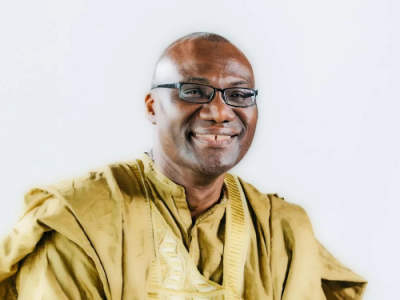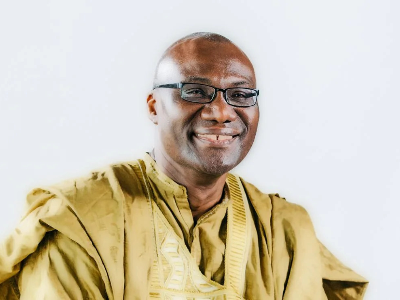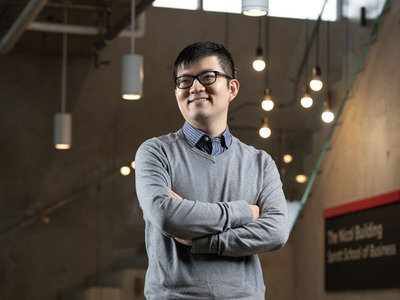By Tyrone Burke
Photos by Chris Roussakis
 Every incoming student knows the demands will be different in university, but what does that mean, exactly? And how can you prepare for it?
Every incoming student knows the demands will be different in university, but what does that mean, exactly? And how can you prepare for it?
The Carleton Science Student Success Centre helps new students excel through a peer-mentorship program in which upper-year undergraduate and graduate students share their experience, advice and subject expertise.
On April 15, nine of its volunteer mentors were honoured with the Ontario Volunteer Service Award Medal for Young Volunteers. Awarded by Ontario’s Ministry of Citizenship and Immigration, the medal recognizes youth aged 15 to 24 who have volunteered a large number of hours for an organization and are role models for other young people.
“In the Kickstart program, we take the first-year students coming into science, and run them through a series of workshops at the beginning of the year,” says Natasha Osborne, who led Kickstart for the past two years.
“We teach them how to write lab reports, how to prepare for exams successfully, how to manage stress. It helps them prepare for first-year. Basically, we support them in any way, and help them transition.”
Osborne’s voluntarism was recognized alongside eight other students with at least two years of service: Jared Browning, Mustafa Hamid, Katharine Healy, Martin Lunn, Lina Serry, Chantal Shaib, Erin Vanzyl and MaryAnn Wu.
More than 1,000 students attended at least one Science Student Success Centre event this academic year, engaging with more than 40 mentors who offer advice in careers, community, computer science and health care. Mentors commit to 25 hours of training through the year, and at least three hours per week for drop-in mentoring at the centre.
For all involved, it’s a learning experience.
“When I started university, I didn’t know about the resources on campus,” said Hamid. The Carleton biology and neuroscience graduate has moved on to his master’s in Biology at the University of Ottawa, but continues to donate his time to the Science Student Success Centre.
“In third year, I got involved, and thought this is so useful. I want to be part of it and help other students to get the resources that they need, and if they have goals they want to achieve or define, to help them do it. The biggest thing it gives is perspective. You see people come in with different backgrounds, different experiences and different needs. Understanding that every student will achieve their goals differently, they’ll go through different journeys to get there is something I’ve benefitted from.”
Carleton’s Student Experience Office offers a similar peer-mentoring program to the broader university community and its mentors were also recognized for their service to the community.
Claudia Calagoure-Perna, David Dobrowolski, Rebecca Drodge, Trina Etmanskie, Cassie Lee, Leah Sweeting, Audry Tipson, Chamathka Varushawithana and Chiara Webb also received the Medal for Young Volunteers.
The mentorship experience offers benefits for mentor and mentee alike.
“It helps students who need a bit of assistance from peers,” says Michel Barbeau, manager of the Science Student Success Centre and assistant dean of Science.
“Professors . . . we can help students, but it’s not like talking with students who went through the same situations. They know how to deal with them. Mentors talk from experience and students who work as mentors build experience. They learn how to interview other people, how to listen proactively. These skills will help in their career, if they’re going to work as managers, for instance.
“Today, we recognize students who serve in the centre. It’s a great opportunity, and I wish more students will take this opportunity to serve and help others. There’s nothing like helping others.”
Martin Lunn is already putting the skills he developed with the Science Student Success Centre to use at work. Lund served as computer science team lead last semester, and credits his time at the centre with helping him make a smooth transition to his internship with Kinaxis, a Kanata-based supply chain solution provider.
“The technical skills I use on the job are obviously very different, but the soft skills are more applicable than any soft skills I learned in class,” Lunn says.
“It was a nice change of pace to be helped along, but also something I’m not accustomed to. It’s been a hard adaptation, and when there’s an adaptation, it always helps to have someone who has your back.”
Tuesday, April 17, 2018 in Campus News
Share: Twitter, Facebook



